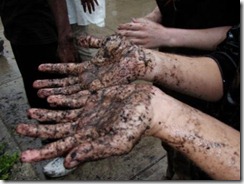by Diane Holmes, Marketing-Zone: Marketing Yourself and Your Book, founder of Pitch University.
Because I’ll be attending Story Masters Conference (Houston, TX, Nov. 3 – 6, 2011), I decided to interview the three keynote masters of story craft, including Christopher Vogler, founder of StoryTech consulting.
Chris is extremely well-known for his book, The Writer’s Journey: Mythic Structure for Writers, now in its 3rd edition. And he’s worked on many well-known movies for DreamWorks, the Disney studio, Fox2000, Warner Bros, and others in their story departments. 
Psst. You can get a free chapter from his latest book, Memo from the Story Department: Secrets of Structure and Character in the post I wrote over at Pitch University: The Story Master’s Journey by Christopher Vogler (free bonus chapter!)
Everything I just told you is part of Chris’ brand.
Out of his genuine passion for the mythic roots of storytelling, he brought the power of Joseph Campbell’s Hero With a Thousand Faces to fiction writers of today.
- He has a passion for Myth.
- He knows where stories go wrong.
- He knows how to fix them.
- He knows how to teach this to other writers.
This is his brand.
Simply put, he’s the person who (a) accesses mythic story archetypes and (b) transforms stories so that they (c) reach audiences in a powerful way.
What I love about using Chris as an example in this Author Branding series is that you can really see that his brand is all about him as a person, his passion, his expertise. It’s not a marketing ploy. It’s not a clever tagline that a marketer developed with a test audience.
And it doesn’t even matter if you’re a Hollywood exec or a writer at a conference. You’re interested in him for the same reason.
The guy can make stories dance.
Not with tricks. But with mythic power. There’s nothing artificial here. Chris followed his Bliss (to quote Joseph Campbell). And his bliss became his brand.
One Step Further
So, I asked Christ for a couple of examples of authors who he thought did a good job of author branding.
I worked with an enterprising author named Michael Thompkins who drew on his background as a psychologist working with the Palm Springs Police Department to create a book series he branded as “The Shooting Shrink” series.
I learned a lot from prolific novelist Susan Wiggs who has created a warm, fuzzy world of communicating freely with her readers and offering them frequent glimpses of her life, travels, and working environment.
— Christopher Vogler,
What did Michael Thompkins do? He used his passion for psychology to brand himself and his books. He didn’t create something artificial. He actually likes psychology.
Here, the link if very overt. Thompkins is an expert in his field, and his character is an expert in the same field.
But few writers have this luxury. (Or else there’d be a lot of books where the protagonist is, herself, a writer.)
But look at how Susan Wiggs created a link between her author brand and her books. She interacts with her readers from the same set of values (warm relationships, close ties, small town feel, family & friends) that her books celebrate.
These are the same themes she explores in all her stories, and it’s what her readers like best in every book she writes, no matter what the protagonist’s occupation.
I would call this Susan’s passionate approach to life. And it has become her author brand.
Michael and Susan, also, followed their bliss.
And I want this to become your True North when searching for your Author Brand. It’s authentic. It’s you. And it’s born of your own internal passion.
“The privilege of a lifetime is being who you are.”
Joseph Campbell
Welcome… to being you.
—
This is the 10th in a series on Author Branding.
Previous articles include:
1. Author Branding vs. an Army of Writers
2. The Author’s Branding Manifesto
3. The Gleam in Your Author Brand (Brand Building Technique #1)
4. Storytelling Your Author Brand (Brand Building Technique #2)
5. Yes, Your Book Is Part of Your Brand (part 1) (Brand Building Technique #3)
6. Yes, Your Book Is Part of Your Brand (part 2) (Brand Building Technique #4)
7. Your Author Brand: What Do You Want People To Say Behind Your Back? (Brand Building Technique #5)
8.Author Branding: “The Brand Your Brand Could Smell Like.”
9. Your Power as a Writer = Your Author Brand (with Donald Maass)
—-
 Diane writes two columns for Freelance-Zone: Fiction-Zone: Leaps in Fiction Mastery and Marketing-Zone:Marketing-Zone: Marketing Yourself and Your Book.
Diane writes two columns for Freelance-Zone: Fiction-Zone: Leaps in Fiction Mastery and Marketing-Zone:Marketing-Zone: Marketing Yourself and Your Book.
She’s the Founder and Chief Alchemist of Pitch University – “Learn to pitch your book from the AGENTS and EDITORS who make their living at it. Learn. Pitch. Sell.”



 But specifically it means at least one character now, right-this-very-minute, knows it. There was now, when the character did not know something was bad, and now there is after, the new now.
But specifically it means at least one character now, right-this-very-minute, knows it. There was now, when the character did not know something was bad, and now there is after, the new now.


